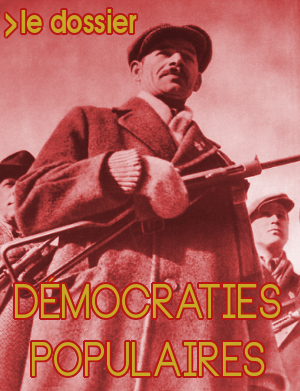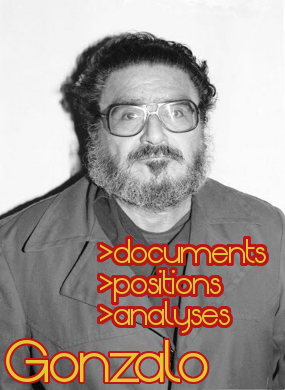Gonzalo, the united Front and the Communist International
Submitted by Anonyme (non vérifié)In the document of the Communist Party of Peru “The international line”, from 1988, the following thing is explained:
« Two problems emerged in the Communist International during the 1920s which were to have great repercussions: The problem of Germany (or rather, the revolution in an advanced country), and the problem of China (or revolution in a backward country).
The situation became more acute with the emergence and victory of fascism and the question on how to conceive the United Front. Thorez and Togliatti proposed revisionist opinions, seeking to support rather than destroy the old order, while focusing solely on the anti-fascist struggle.
It is an urgent task for Communists, and for our Party, to evaluate the Communist International, especially its VII Congress before World War II, and the role of Comrade Stalin. »
In these lines, written by Gonzalo, we find the following ideas:
 a) the “united front” is a necessity, valid both for an advanced country and a backward country, i.e. an imperialist country and a semi-colonial semi-feudal country;
a) the “united front” is a necessity, valid both for an advanced country and a backward country, i.e. an imperialist country and a semi-colonial semi-feudal country;
b) the revisionists limited the front to anti-fascism solely and in this way “forgot” the task of the socialist revolution;
c) the communists have the task to understand this whole process, in particular the 7th and last congress of the Communist International and the role Stalin played here.
There are four sets of documents that we produced which analyze those questions:
a) the set about the 6th of february 1934, i.e. the attempt of a fascist coup in France and the antifascist popular answer which followed, producing the popular Front;
b) the set about Maurice Thorez and its conception of the popular Front through the 1930's;
c) the set about the people's democracies in the eastern European countries after 1945, in particular from 1945 to 1956;
d) the set about the history of the Communist International.
[None of those sets are available in English yet.]
We can conclude the following things from those sets:
1. The United front against fascism was a failure in France as it stopped at half way; there was no cultural and ideological struggle. The opportunist line considered that against the fascist threat, against the power of the monopolies, there would be a mechanical movement of the masses and the “middle class” to unite.
This tendency should be organized in the frame of the bourgeois republic, so to not to scare the liberal bourgeoisie. The state would tend to collapse under the pressure of the monopolies, but the democrats would permit that it maintains itself, in a “democratic” form.
Such a line had a consistency in Spain, where the Communist Party was weak and where there already an armed struggle against the fascist coup led by Franco. This was not certainly not the case in a country like France, where the state was bourgeois and therefore has to be destroyed.
 The opportunist line, from Thorez to Prachanda, negates the necessity of destroying the old state – on all fields: military, culturally, ideologically. It reflects the non-understanding of the guiding aspect of ideology in a country, the non-understanding of the necessity of the thought, as guiding reflect of the tasks of matter in its development.
The opportunist line, from Thorez to Prachanda, negates the necessity of destroying the old state – on all fields: military, culturally, ideologically. It reflects the non-understanding of the guiding aspect of ideology in a country, the non-understanding of the necessity of the thought, as guiding reflect of the tasks of matter in its development.
2. It is very important to see that Thorez betrayed the principle of the uninterrupted revolution. He recognized that there were stages, but he considered that the stage where the bourgeois state is destroyed could be avoided.
This permitted trotskism to be very strong in our country, with an opportunist criticism of the uninterrupted revolution, in the name of the “permanent revolution”, which negates the stages and so the necessity of an anti-fascist united Front.
In the name of the “permanent revolution”, trotskyism acted as the fifth column of fascism, using leftist demagogy to appear radical, with the goal in fact of breaking the united front, stopping the integration of sincere antifascists that could be religious, liberal bourgeois, reformist, etc.
Such a role played the POUM in Spain, for example, during the civil war.
3. The United front against fascism is an absolute necessity against fascism. As Mao Zedong remembers us in the document “On Coalition Government”:
“It is a law of Marxism that socialism can be attained only via the stage of democracy.”
Before the socialist revolution, there will be a people's democracy against the fascist threat or fascism itself – but this means the destruction of the old state, it can't happen in the frame of the bourgeois state.
The practical way for this has still to be elaborated; this is the task of the CPMLM [France]. In Eastern Europe, the people's democracies could exist because of the success of the Red Army against Nazi Germany and so the breaking of any armed reaction afterwards. How shall this process of people's democracy exist in a country where the old state has to be crushed by the people's war?
 4. The 7th congress of the Communist International can't be understood without the 6th congress. In fact, the problem was lack of dialectical materialist understanding of social-democracy.
4. The 7th congress of the Communist International can't be understood without the 6th congress. In fact, the problem was lack of dialectical materialist understanding of social-democracy.
It was correct to understand social-democracy as a twin of fascism – in the spirit of the 6th congress. But it is also correct to see social-democracy as a necessary ally against fascism – in the spirit of the 7th congress.
Social-democracy has two aspects – communist must understand the importance of both the 1928 and the 1935 congresses of the Communist International. The changes in social-democracy, according the main aspect in a given society, have to be understood in a political correct way, or the building of the Front would be impossible – either because of left opportunism and sectarianism tending to trotskyism, or because of right opportunism and the betrayal of the socialist revolution.
5. About the role of Comrade Stalin: Stalin didn't play a main role in the present question. He was not present during the 7th congress of the Communist International where Dimitrov formulated the line of the “popular front” as valid against fascism in the imperialist countries.
He didn't see the two line struggles that was appearing between the red line and the black line on this question, permitting Thorez to apply a very opportunist line, followed then by Togliatti and all the revisionists after 1945 in Eastern Europe.
It is here also to note that Stalin didn't proceed to the criticism of the opportunism of Thorez, in a pragmatic way because the USSR tried to gain France as a military ally. This was a shortsighted view, a pragmatic-machiavellian deviation of comrade Stalin, even if we have to say that in France the Communist Party was in fact a genuine social-democracy only, equivalent to the German one of the end of the 19th century.
